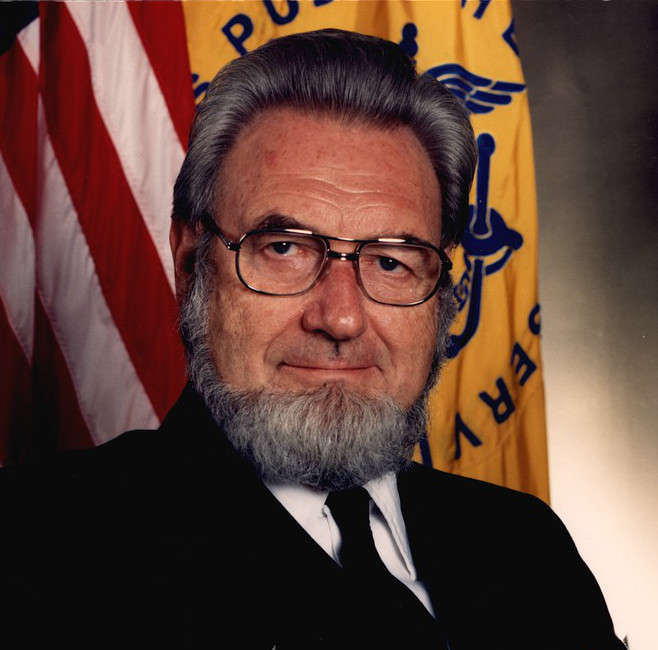Nigel Cameron’s biography, Dr Koop: The Many Lives of the Surgeon General, will be published in 2025 by the University of Massachusetts Press.
Charles Everett Koop, 1916-2013
Dr. Koop was one of the best-known and most influential Americans of the late 20th century.
He is important for many reasons beyond his astonishing resume, and he is ripe for presentation to a new generation. He was simply one of the most interesting Americans of his time – with resonance for ours.
He was a model of integrity in public health, and respect for science – at a time when pressures on public science have never been stronger. A convinced social conservative, he was fighting racism and antisemitism back in the 1940s and 50s. A man of intensely strong moral and religious convictions, and boundless energy, he was also a model of courtesy in disagreement. Diminutive Congressman Henry Waxman had bitterly fought his nomination, but once confirmed they worked together; Koop would later describe him as “the biggest man in Washington.”
What’s more, Koop had a genius for public relations – from his adroit handling of press conferences that turned them into major media events to his revival of the Admiral’s uniform that, together with the beard, made him an instantly recognizable figure nationwide. (Several toy manufacturers marketed Koop dolls!) He also had a genius for friendship, cultivating warm personal and professional relationships wherever he went. A man of deeply conservative (the press would say, inaccurately, “fundamentalist”) Christian faith, he flourished in secular, cynical Washington. And, a generation later, we look back with admiration on how he led the public fight against AIDS, the last deadly pandemic, and astonished Americans of left and right by making common cause with progressives including leaders of the gay community to save lives – facing down moralistic hyper-conservatives who wanted the HIV-positive quarantined, or tattooed, or sent to Alaska.

When President Reagan nominated him in 1981 to be Surgeon General, he was the world’s most famous pediatric surgeon. He would be at the heart of three of the great controversies of his generation, over smoking, AIDS, and abortion. As Surgeon General, he called out Big Tobacco, named secondary smoking a danger to health and nicotine addictive, and he launched a campaign for America to be “smoke-free” by the year 2000. Smoking dropped by more than one-quarter during his years in office. He shaped the U.S. response to AIDS with his astonishingly candid 1986 report, and the mailer that followed it into every American home (a first). Meanwhile, back when Roe vs Wade was handed down in 1973, he had launched a personal, and ultimately successful, campaign to pull conservative Protestants into the (then largely Catholic) “pro-life” movement.
After stepping down as Surgeon General Koop fronted Emmy-winning network television specials on healthcare, chaired a company spun off by Time-Life to make medical videos for sale in pharmacies, and then in his 80s was caught up in the frenzy of the dot-com bubble and helmed the first big healthcare website, DrKoop.com. Not all these projects were equally successful.
“I remember so many things that this wonderful man did. He became one of the most popular people ever in the history of government. And we all love him to this very day.”
Republican Senator Orrin Hatch
As Surgeon General, Koop rapidly became the best-known member of the Reagan administration after Reagan himself. Initially nominated to please religious conservatives, he declined from the start to use the Surgeon General’s bully pulpit to campaign further on abortion. His conception of the sanctity of life and the dignity of the individual was broad, and included myriad other challenges, from smoking to drunk driving to domestic abuse and the needs of the disabled. His views didn’t change, but – to everyone’s surprise – his focus did.
Back in 2006 I was invited to his 90th birthday celebration in Washington, DC’s Cosmos Club. Republican Senator Orrin Hatch introduced Koop with these memorable words: “I remember so many things that this wonderful man did. He became one of the most popular people ever in the history of government. And we all love him to this very day.” Senator Hatch’s co-host was Democratic Senator, soon to be Secretary of State, Hillary Clinton.
More than forty years after he took office, it is remarkable that there has been no full-scale biography of the “Immortal Surgeon General” (as USA Today headlined his obituary). Now, at last, there is one in preparation and will appear in early 2025.



